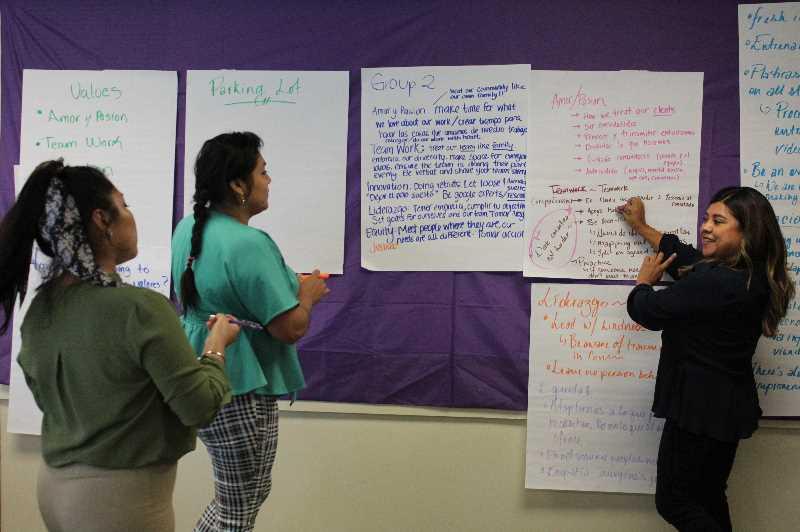
Nicolas Romero Guillen had a small blister on his heel in December 2020. Before long, what seemed like an easy-to-treat blister was diagnosed as an infection that spread to his leg. Guillen, who is diabetic, didn't have health insurance.
Guillen was able to receive help from the Latino Health Coalition to see a doctor, but not soon enough. His leg was amputated in June 2021 to prevent the spread of infection and save his life.
“The only reason he didn't see anyone was because he didn't have insurance,” Yessenia Melchor Baltazar, a community health worker at Latino Health Coalition, said. They didn't know how the system works and they were under the shadows.
Guillen is one of thousands of Oregonians who couldn't see a doctor in time to treat his condition. A new bill passed in Oregon will prevent that from happening again.
Cover All People, signed into law July 19, will implement a $10 million program to provide health insurance to an estimated 80,000 people who previously had no coverage. Those who aren't eligible for the Oregon Health Plan, or who were eligible for Cover All Kids but aged out of it at 19, will be provided high-quality coverage for physical, behavioral and oral health care at the same level as the Oregon Health Plan.
The program starts in June 2022 and is expected to cover 60,000 to 80,000 adults. The program will serve parents, guardians, or relative-caregivers of children and dependents receiving care through the Cover All Kids program and the young adults who age out of it. Cover All People also will help medically underserved people, including undocumented adults, DACA recipients, legal permanent residents, and all people at or below 138% of the Federal Poverty Level, regardless of immigration status.
DACA is the Deferred Action for Childhood Arrivals program, designed to help people brought to the country without documentation as children.
It also covers pregnant adults up to 190% of the federal poverty level.
In a 2016 study, the Pew Research Center in Washington, D.C., estimated there were 60,000 to 80,000 adults in Oregon below 138% of the federal poverty level.
The Cover All People program is designed to improve health outcomes for youths by ensuring their parents are provided with access to better health care and a stronger economy, as having quality health care coverage is linked to obtaining and maintaining employment.
The Oregon Latino Health Coalition, a nonprofit state-wide Latino culture-specific organization that addresses and eliminates health disparities among the Latino community, was a leading advocate for the new law. The organization held weekly meetings with government officials over the bill's six-month legislation period and acquired 60 endorsements for the measure. The organization and its executive director, Olivia Quiroz, worked hard to strengthen access to health care within the Latino population, especially those who are undocumented.
“One of the impacts is that people will get access to preventative care,” Quiroz said. We want people to address their early chronic illnesses and any condition they might be experiencing before it gets out of hand. This is such a key part of prevention and ensuring that fewer people in our community get ill and carry the burden of their medical costs. We want to make sure the people in our community are healthy and protected and are able to work and take care of their kids and contribute back.
Melchor Baltazar, who also works as an assistant with the Oregon Health Plan's Community Partner Outreach Program, helps people in the Latino community get enrolled with Oregon Health Plan. Baltazar helps 15 to 20 people per month get their Oregon Health Plan coverage and will be doing the same with the Cover All People program. She helps spread the awareness of the available options and programs to all those she can reach and need health coverage, manages cases, does in-person visits to patients and families, and accompanies patients to their doctor appointments to interpret and make sure the patients are getting the care they need while being well informed.
Melchor Baltazar was able to help Guillen get the coverage he needed from a financial aid program to get his leg amputated to prevent further spread of the infection and save his life. The Cover All People Program will help him keep his diabetes at bay and make sure he can get regular checkups with a primary care provider and have access to any needed medication.
“Honestly, that's what saved his life, that he applied for the financial aid program,” Melchor Baltazar said. With the new healthcare coverage, he will be able to get a prosthetic leg and will have better management of his diabetes and other health-related issues.
“Thanks to Cover All People, all people can have coverage no matter what their immigration status is, and that saves lives,” Guillen's son, Guadalupe Romero Guillen, said. “It's really hard and sad to have a family member that's sick and can't be treated because of immigration status when health coverage is a right.”
This story was originally published by Pamplin Media Group and is possible because of Amplify, a community storytelling initiative of Pamplin Media Group and Care Oregon. Amplify supports summer internships for high school journalists in the Portland metro region and aims to elevate the voices of student journalists from historically underrepresented groups, such as communities of color, low-income residents and others.